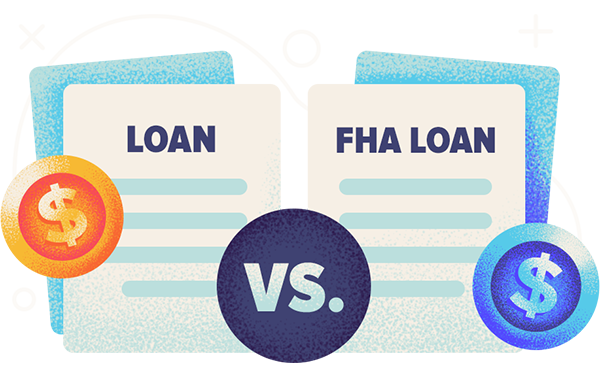One of the biggest choices any home buyer has when taking out their loan is deciding whether or not they want to get an FHA loan or a conventional loan offered by a private lender. Picking between the two options can be very tricky--depending on a buyer’s situation each has its own advantages and disadvantages. Since many borrowers will be able to qualify for both types of loans, most will need to get an idea of how the loans work before they make a decision either way.
Conventional Loans
A conventional loan is one offered directly by a private lender like a bank, credit union, or mortgage company. This can be confusing for a borrower at first because these same lenders will likely also offer FHA backed loans which are separate programs with their own rules and regulations. Most conventional loans will instead be backed by Fannie Mae or Freddie Mac, which use a different set of rules and guidelines.
-Higher Credit and Down Payment Requirements
Conventional mortgages have become more difficult for borrowers to get as the credit score requirements and minimum down payment have steadily risen in the years since the financial crisis began. In most cases a borrower will need a credit score of at least 620 to get a conventional loan, and have to be willing to put down at least 5%. Even in those cases, a borrower will likely face extra fees and higher rates if they have less than perfect credit or want to make a small down payment.
-Wide variety of loan options
Borrowers tend to pick conventional mortgages because they offer a wide variety of different loans options. For instance, a borrower could readily find a conventional mortgage with a 30 year, 20 year, 15 year loan with an adjustable rate, fixed rate, or interest only option. In most cases a borrower will be able to customize their loan to their situation, picking one that suits them best.
-Less red tape
While conventional loans are by no means quick and easy to obtain, they are usually faster to get than an FHA loan. Most FHA loans require a borrower to get a specialty home inspection and to show that the house meets certain other minimum requirements that aren’t present on most conventional loans.
-Higher Upfront Fees
One of the downsides of working outside of the FHA system is that lenders are free to charge any fees they want. Most conventional loans will come with a long list of potential fees that a borrower will either have to pay or negotiate to have waived.
FHA Backed Loans
The most common misconception of FHA loans is that they are actually offered by the federal government – they are not. Instead, a regular mortgage lender like a bank or credit union offers a loan that is insured by the FHA; with the FHA setting guidelines the lender must follow in order to keep their insurance. For a borrower this means that the terms and conditions of an FHA loan will be largely the same from lender-to-lender, though the interest rate and fees may vary from one to another.
-Low Credit Score Requirements and Down Payments
FHA loans have become more and more popular since the financial crisis because they are available to borrowers with a lower credit score or who can only make a small down payment. FHA programs often look at a borrower’s credit history, rather than just making a decision based on their raw credit score. The FHA does not even set a minimum credit score for their loans, though the lender making the loan will usually not look at a borrower with a score below 500. Additionally borrowers will have to put down at least 3.5% to get an FHA loan.
-Easy Refinancing
Borrowers have also flocked to the FHA Streamline refinance program in recent years, because it offers an easy, low cost way to refinance into today’s record low interest rates. In most cases the Streamline program is both faster and less expensive than other available options. A borrower does not have to have an FHA loan to use the Streamline program; it is open to any borrower who meets its requirements.
-Lower Fees
FHA guidelines prevent their lenders from asking for many types of administrative fees that are common on conventional mortgages. Otherwise, borrowers are on their own when trying to negotiate these fees out of their mortgages.
-Higher Mortgage Insurance
Mortgage insurance on an FHA loan tends to be more expensive than on a conventional loan because the lenders are protecting themselves against the lower credit requirements and lower down payments offered by most FHA programs. Not only will a borrower have to pay a large up front mortgage insurance premium, they will also have to continue paying for mortgage insurance until they own at least 20% of their home.
-Higher Interest Rates
The interest rate on an FHA loan tends to be higher than what is available on other conventional loans.
-Few loan choices
Because of the strict FHA requirements, there are only a limited number of loans offered as an FHA program. For a borrower this means they will likely only have a few different loans from which to choose, and will have to accept a loan that might not fit them well.
Summary
Most borrowers with the best credit tend to choose a conventional loan that very tightly fits their situation. FHA loans, on the other hand, have become more popular with borrowers with shakier credit histories, especially those who want to refinance into a fixed rate loan. While most borrowers will qualify for both types of loans, as always the choice should come down to what will help the borrower most.

WalletHub experts are widely quoted. Contact our media team to schedule an interview.